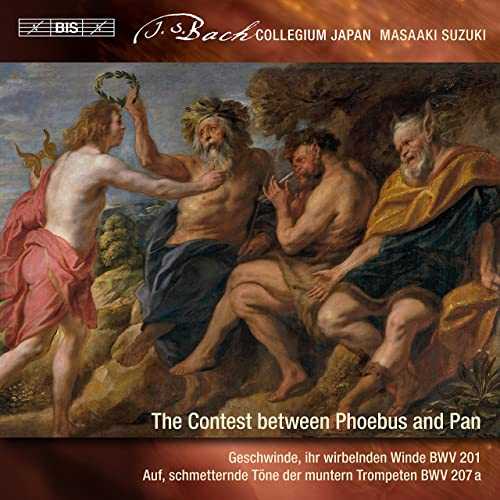
Composer: Johann Sebastian Bach
Performer: Nicholas Phan, Joanne Lunn, Dominik Wörner, Robin Blaze
Orchestra: Bach Collegium Japan
Conductor: Masaaki Suzuki
Format: FLAC (tracks)
Label: BIS
Release: 2018
Size: 1.5 GB
Recovery: +3%
Scan: yes
Cantata BWV201 ‘Geschwinde, ihr wirbelnden Winde’
01. No. 1, Geschwinde, ihr wirbelnden Winde
02. No. 2, Und du bist doch so unverschämt und frei
03. No. 3, Patron, das macht der Wind
04. No. 4, Was braucht ihr euch zu zanken
05. No. 5, Mit Verlangen drück ich deine zarten Wangen
06. No. 6, Pan, rücke deine Kehle nun
07. No. 7, Zu Tanze, zu Sprunge, so wackelt das Herz
08. No. 8, Nunmehro Richter her
09. No. 9, Phoebus, deine Melodei
10. No. 10, Komm, Midas, sage du nun an
11. No. 11, Pan ist Meister, lasst ihn gehen
12. No. 12, Wie, Midas, bist du toll
13. No. 13, Aufgeblasne Hitze
14. No. 14, Du guter Midas, geh nun hin
15. No. 15, Labt das Herz, ihr holden Saiten
Cantata BWV207a ‘Auf, schmetternde Toene’
16. No. 1, Auf, schmetternde Töne der muntern Trompeten
17. No. 2, Die stille Pleiße spielt
18. No. 3, Augustus’ Namenstages Schimmer
19. No. 4, Augustus’ Wohl ist der treuen Sachsen Wohlergehn
20. No. 5, Mich kann die süße Ruhe laben – Ich kann hier mein Vergnügen
21. No. 6, Augustus schützt die frohen Felder
22. No. 7, Preiset, späte Folgezeiten
23. No. 8, Ihr Fröhlichen, herbei
24. No. 9, August lebe, lebe, König
25. No. 10, Marche
Recorded: September 2016
Recording Venue: Kobe Shoin Women’s University Chapel, Japan
Most of Johannes Sebastian Bach’s secular cantatas were written for specific political, academic or private festive occasions. In the case of Geschwinde, ihr wirbelnden Winde, BWV 201, however, it may well be that Bach composed it for his own sake: the message conveyed in the work can be interpreted as a defence of Bach’s own artistry and musical attitudes against the trend of the time towards easier fare. Subtitling the cantata ‘dramma per musica’, Bach sets an episode from Greek mythology in which Phoebus (Apollo) and Pan enter into a musical contest. Phoebus, the god of the arts, presents a beautifully balanced and technically accomplished aria, while Pan sings a rustic dance tune. The judges offer Phoebus the prize, but the verdict isn’t unanimous – King Midas prefers Pan’s catchy ditty, for which Phoebus punishes him by giving him donkey ears. On this amply-filled disc Bach’s praise of high art is followed by another tribute, now to Augustus III, Elector of Saxony and King of Poland. It is likely that Augustus never knew that the same music had been used 10 years earlier to congratulate a Leipzig academic on his promotion: Auf, schmetternde Töne… BWV 207a is based almost entirely on Vereinigte Zwietracht der wechselnden Saiten, BWV 207. But Bach was something of the recycler’s recycler, and already BWV 207 included music from the First Brandenburg Concerto, with a choir added to the forces, and trumpets and timpani replacing the horns.



